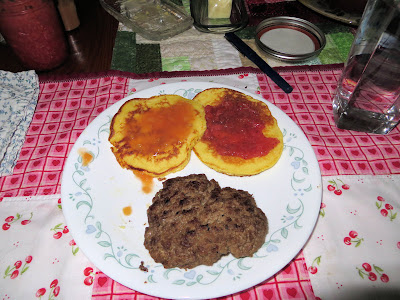The farm we bought the cow from is called Green Heron Growers, and they have a nice little farm here in Western New York close to where Chad and I live. It was a pretty drive out to their farm. It was kind of overcast that day, and it was sprinkling off and on, but we brought umbrellas so we wouldn't be too uncomfortable.
There were several people there already when we pulled up. It was kind of funny, actually. We were the only people there who didn't have their own farm, but everyone seemed so.... normal. Not farmerish at all. The folks that owned Green Heron Growers themselves looked like they used to be hippies, to be honest!
Their farm is based very strongly on Joel Salatin's farm Polyface Farms, which is an intensive grazing system that promotes healthy animals, healthy land, and healthy people. Instead of destroying the land, it improves it by adding topsoil and nutrients. The animals eat the foods that they naturally eat in nature (GRASS!). And because the animals are eating naturally and are happy, the meat they produce is healthier for people, too.
The farmers first showed us their baby broiler chicks that were soon to go out to the pasture.
Then we headed out to their pastures, and talked about what they're doing to improve the land.
 |
| Even the dog likes eating the grass. |
I was amazed when they told us that they actively seeded their fields with lots of legumes (clovers in this case) and lots of different kinds of grasses to provide the perfect balance for the cows to eat. Not too much protein, not too much carbohydrate, and not grasses that were too tough to eat.
If you looks close, there really are all kinds of different grasses and clovers in this field. I'll never look at grass the same way again.
They took us to their chicken tractors next, but along the way, I got this shot. The farm across the way is an organic Amish dairy farm.
The chicken tractors were really cool. What these are are outdoor pens for their broiler chickens. They move them twice a day, so the chickens get a fresh crop of grass and bugs, and so the field gets fresh chicken poop fertilizer all over. The tractors also help protect the chickens from natural predators, like raccoons, skunks, and coyotes.
While we were there, he moved it for us so we could see how excited the chickens got when they got a fresh supply of grass and bugs.
After that, we walked on down to where the cows were that day. Along the way, I caught a couple of pictures of some Amish buggies driving by. This isn't unique for us to see in our area. I see Amish people all the time because there's such a large group of them around here. But I thought it was a pretty picture.
And then, cows!
They have a herd of 37 cows, mostly mixed, but all have Red Devon in them somehow. He said this was very important to him, because the Red Devon is an extremely docile cow, and he believes that the temperament of the cow in life has a lot to do with how it tastes later on.
Every day, they move their herd to a new paddock, or small sectioned off pasture. That way, the land has a chance to recover, and the cows get fresh new grass every day. This ensures that the cows are eating the very best food every single day, just like they would do if they were in the wild.
There was a cute little baby cow that had gotten loose from the rest of the herd, and he just kept mooing at us. When the farmer tried to catch him, he ran around like a little kid! It was pretty cute.
The farmers actually name each cow born on their farm, that's how much they care about them. The little calf that got loose was Midnight.
Then they invited us into the new paddock they were moving the cows to, so we could watch them enjoying the new grass.
Oh my, they were so loud! They chomped like mad! They started out on the other side of the paddock to us, but they just kept getting close and closer and closer.
This one was just a few feet away before she realized she had to turn and go the other way!
The red devon is so docile that he managed to get quite friendly with some of the calves born on his farm.
 |
| I accidentally captured his Amish neighbor, so I put a yellow dot there to hide his face; they prefer not to be photographed. |
It was a long tour. We were out in the fields nearly 3 hours, but I learned a lot and it rekindled my passion about farming someday. I don't think we'll have cows right away, or possibly ever, but we'll definitely be caring for some kind of animals. Chickens at least, and possibly sheep or goats.
On the way back to our car, I saw some free range laying chickens in their back yard.
It was really cool visiting the farm we bought our meat from. It made me really appreciate our purchase, and cemented the idea of buying from them again.
By the way, did you know hows have whiskers?
















































